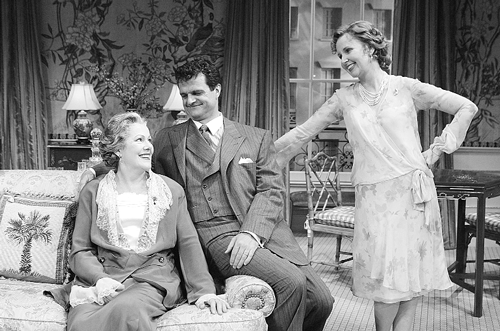Maugham’s “Constant Wife” scores; Simon Lovell goes straight
THE CONSTANT WIFE
Roundabout Theatre Company
American Airlines Theatre
227 W. 42nd St.
Tue.-Sat. 8 p.m.;
Wed., Sat., Sun. 2 p.m.
$46.25-$86.25; 212-719-1300
SIMON LOVELL’S STRANGE AND UNUSUAL HOBBIES
Soho Playhouse
15 Vandam St., btwn. Sixth Ave.
and Varick St.
Sat. 10 p.m.
$25; 212-691-1555
Kate Burton (r.) is Constance, the calm center of the storm in the Roundabout’s production of “The Constant Wife,” seen here with Michael Cumpsty, as her husband who finds his passions elsewhere, and Lynn Redgrave, as her mother who is protective, though she need not be.
In our depressingly strident contemporary culture, where critical thinking has been replaced by talking points, it’s very possible that the dazzling Roundabout production of Somerset Maugham’s “The Constant Wife” could pass merely as a delightful summertime comedy of manners with a sumptuous set, a beguiling cast and a fun story of how a clever woman turns the table of social conventions on her upright, ardent though slightly dimmer husband.
Maugham’s play can certainly be enjoyed on that level, and a good thing, too, as polemics don’t always make for popular theater. However, the real richness of this play—and the reason for its current relevance—comes in the larger consideration of the role of marriage in human culture. Maugham was writing about the conflict between the economic realities of marriage and the romantic notion of the love match, but his larger theme is the messy nature of human relations and the need to make peace with our hearts, separate from convention, traditions or even interpretations of holy writ.
In our time, when marriage equality is being held hostage by those who proclaim they know the word of God but who are, in fact, slavishly bound by fear and resistance to change, “The Constant Wife” happily attacks the sacrosanct and finds a living, breathing and truthful humanity.
Constance and John have been married for 15 years, and while they still have a great deal of affection for one another, the inevitable decay of passion has left them in a comfortable, companionable yet passionless marriage. John has taken up with Marie-Louise, and everyone—Constance’s sister and mother in particular—are fearful that Constance will find out. And here we get into one of the most fascinating arguments of the play—the difference between fidelity and constancy and what impact that has on the meaning of marriage.
More directly, what do sex and monogamy have to do with a happy marriage, if anything?
Constance has come to the conclusion that marriage for all its pleasantness is ultimately an economic bargain and “the modern wife” runs the risk of becoming a “prostitute who doesn’t deliver the goods.” She takes a job, and in buying her financial freedom finds her emotional footing. Maugham fearlessly tackles the ambiguities of the institution of marriage with great affection for the characters and an unclouded eye on human nature and in the end tells the truth, which is both liberating and a relief.
Mark Brokaw brings his trademark directorial style to this production, juxtaposing witty interplay and fluid staging with a deep understanding of the characters’ truth. The production hasn’t skimped on detail, and yet there is irony in its opulence in that no matter the level of decoration, human nature cannot be contained.
The cast is a treat. Kate Burton is just wonderful as Constance, playing her with a controlled good humor and an equanimity that comes from her solid grip on reality. She is the calm center in a storm of hidebound convention and artifice and conveys a level of maturity that makes her a galvanizing presence on the stage. It’s terrific to see Michael Cumpsty—straight from “Democracy”—demonstrating his terrific comic chops as John, who is all sanctimonious bluster and self-indulgence. Cumpsty amply demonstrates both as well as the final acceptance of reality and shedding of convention.
Lynn Redgrave is wonderful as Mrs. Culver, Constance’s mother. With all her great charm and regal bearing, she is also fearlessly ridiculous when need be and, as always, a delight to watch. John Dossett as Constance’s long-ago rejected beau, is the catalyst for the plot turns, but is also a suave and centered presence in the plot.
The wonderful set is by Allen Moyer, and the costumes by Michael Krass are both perfect for the period and appropriately humorous—especially the overdone clothes for Redgrave—in pointing up the absurdity of social convention.
You may go to this for the fun, but stay for the ideas. If only the dialogue about marriage in our culture were so refreshingly honest, we’d probably see marriage equality moving much faster and with a more human—and humane—result.
Simon Lovell is an appealing and elfish man who, given half a chance, would rob you blind. In fact, he has robbed many people blind, which landed him in the hoosegow on several occasions for a variety of hustles and cheats.
Lovell has gone straight and transmuted his felonious activities into a rollicking cabaret act called “Strange and Unusual Hobbies,” that exposes the tricks and the cons.
The show is appealing as an inside view of dirty dealing, sleight of hand and escapology, but it trades on Lovell’s abundant good will and geeky charm. I found myself alternately caught in a belly laugh—not just from the political commentary but also the unusual use of puppets—and in awe of his skill, which he says was developed over many years of practice.
The hour-long show is an unalloyed pleasure and shouldn’t be missed. Witty and magical, this is a fantastically engaging show that has settled in for an open run at the Soho Playhouse. We can only hope that full houses will contribute to keeping Lovell on the right side of the law. Cabaret can’t pay as much as crime, but when the stripes on his suit are vertical rather than horizontal, we’re all better off.
gaycitynews.com



































